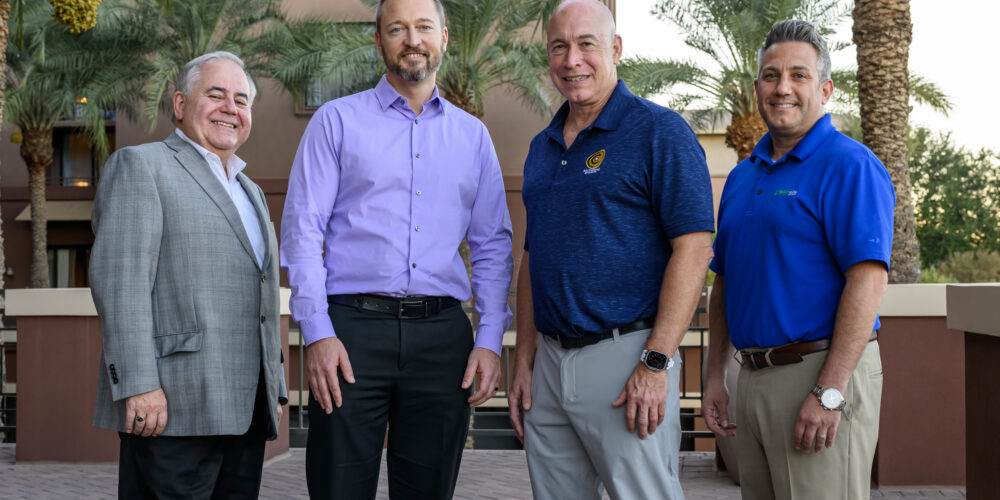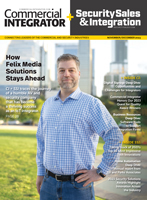Security Business Leaders Speak Loudly and Clearly About Key Industry Issues
At our annual Resideo dealer and installer roundtable, security business leaders opine on issues affecting profitability and success.

(L-R): Michael Gibson, Jesse Foglio, Doug Yarger and Michael Alfano, the participants in our annual Resideo security dealer and integrator roundtable discussion. (Photo courtesy of Resideo)
Security Sales & Integration exists to help security dealers and installers run more successful businesses and, through the years, we’ve found one of the best ways of doing that is to amplify the voices of some of our most successful industry members.
Thus, we’re proud to present Part 1 of a roundtable discussion featuring four dealers/integrators that have cracked the code to achieving success even in difficult times. All of the companies are Resideo partners who came together at Resideo CONNECT 2023, an annual customer event delivering thought leadership and networking.
This year’s panel includes Doug Yarger, president, SouthCross Security; Michael Alfano, president, greensite Security; Jesse Foglio, president, First Response Security; and Michael Gibson, president, Mulhaupts.
Together, they examine some of the most topical and profit-relevant subjects affecting security businesses today, including interest rates, recurring monthly revenue (RMR), the supply chain, vendor loyalty, emerging technology opportunities, labor utilization and more.
Security Sales & Integration: Share some information about your organization, its unique strengths and its competitive differentiators.
Doug Yarger: SouthCross Security is based in Houston. We have been in business for 25 years, and our primary focus is multi-family. We’re well equipped to deal with portfolios for management companies.
Michael Alfano: greensite Security’s corporate office is located on Long Island, in Ronkonkoma, N.Y. We also have a branch office in the upstate New York area in Rockland County. greensite specializes in alarm, camera and automation solutions for residential, commercial and retail applications.
Jesse Foglio: We serve the entire Portland, Ore., area, as well as other cities throughout the northwest. Our electronic division installs and services intrusion alarm, fire alarm, access control and video surveillance.
We also have our own guard division, which provides alarm response and onsite guard service, all managed by our UL dispatch and monitoring center. Our competitive advantage is to be a one-stop shop that integrates both electronic and physical protection, all single-sourced from one provider.
Most recently, we have been doing proactive video monitoring coupled with audio and alarm response, as well as servicing fire extinguishers to our commercial clients.
Michael Gibson: Mulhaupts has been in business since 1876. We began in the mechanical side of the business, offering keys, locks and door hardware. In the mid-1970s, we entered into the electronic security business.
If you fast forward, today, we sell and install security alarms, fire alarms, access control and video. We also have two UL central monitoring stations. And we continue to provide the mechanical side of our business, offering looks, doors, automatic operators and overhead garage doors. We pride ourselves on being able to cover all openings in a building or home.
Security Sales & Integration: Despite some fairly positive indicators when it comes to consumer spending, unemployment and growth, there’s still a lot of concern about the economy. How is economic anxiety affecting the physical and electronic security industry?
Yarger: With our target market, which is multi-family, we don’t see the economy affecting demand. But we do see it affecting price. It’s always price sensitive. And I think that, as inflation has affected our ability to buy at a consistent price, and moving the target price that we have to do for the customers, that’s the biggest challenge we have.
Alfano: What I see is this: We’ll have a larger project, and the client will scale back because there are financing challenges. Then, it becomes a conversation with the client based on needs, rather than wants. They may want eight cameras for their home and property, but only four cameras are in their budget now. We discuss running wire for all eight so that, when finances allow, they can add the protection.
Our industry is one that allows for most clients to install what they “need” initially, and then build upon that in the future. greensite prides itself on educating our clients and providing recommendations from our skilled sales and technical staff. This gives the client confidence in the system we’ve installed, as well as a plan and provisioning for the future.
Foglio: Although the economy has been in question over the last year, the bigger issue in Portland has been the lawlessness, supported by government leadership. That’s compounded by a lack of government resources to help people in need.
We are 75% commercial-based, and we are finding that business owners who may not have tenants to fill their spaces still need security because a vacant building is a target for transients. Business owners and property managers are frustrated, and, in many cases, they simply can’t risk bypassing security measures without inviting theft and vandalism. So, what was once a “want” has now become a “need.”
Homeowners remain slightly anxious as well. They seem less concerned about highly integrated home automation and more concerned about their family’s safety and security.
Alfano: In my more than 20 years in business, we’ve seen this same economic downturn and the correlation between that and crime rates going up. So, while we have some clients who are looking to scale back their projects, we have just as many — if not more — where it doesn’t make a difference and their scope of work is not minimized. Security for these clients is nonnegotiable.
Gibson: The economy is all over the place. We have a strong backlog of work. Our biggest challenge has been finding people to do the work. Another thing that has caused us some heartburn is trying to get our arms around the price increases for our commercial work, which sometimes take place between the time we quote the project and when we get the approval to move forward. And there’s still a small issue with material supply.
Security Sales & Integration: As we speak, interest rates are as high as they’ve been since before The Great Recession. With money being so expensive, how are integration businesses like yours being affected both in terms of your own operations and in terms of customer financing?
Yarger: We haven’t seen any change as far as demand. But we have seen budgets tightened and a little harder shopping from our customer base.
Gibson: We have not seen a huge change in demand. There is still a good amount of work out there. Our phones are still ringing. I would say that there is more shopping around for lower pricing. What we try to do is sell the benefits of going with our company (e.g., our time in business, the quality of our work, our professionally trained installers and technicians).
Foglio: We are a debt-free company, so, from a cash-flow perspective, we have not been affected. But one of the trends that we’ve seen over the last year with our clients has been an uptick in our payment plan or software-as-a-service (SaaS) option for jobs like video surveillance. It has been utilized much more than the last few years.
Just a few years ago, jobs ranging from $20,000 to $80,000 would be paid upfront for an installation. But, today, clients are more reluctant to do so. They would rather pay over X number of months so they can hold onto their cash. We add interest to the monthly payment, so it becomes a win-win to get the sale.
Alfano: I agree with Jesse about the payment plan and offering payment options to clients. We are a society in which monthly payments for things is standard practice, and it makes financing larger projects more palatable.
So, as a company, we do try to break that down. Instead of an outlay of, say, $30,000, we offer an auto-pay scheduled payment plan to help offset the initial outlay. We also offer more traditional, long-term financing through a lending partner. It absolutely helps to make sure the client doesn’t feel pressured or overwhelmed financially to get the protection they want.
Security Sales & Integration: Clearly, RMR is a major consideration for security businesses, just as it is for commercial AV integrators. Are you looking for more of those OpEx opportunities, as opposed to CapEx opportunities? Are you looking for ways to operationalize this, as opposed to making more capital sales?
Alfano: As far as continuing that monthly model, yes, 100%. In most everything we do, we look at that RMR model. In the past, we would install a camera system and there would be no other money made from that installation, other than the occasional service call.
About five years ago, greensite started offering monthly maintenance plans, which offer no-charge service calls, camera cleaning and remote support. This has created an RMR stream that wasn’t there before. AI and cloud storage are also becoming more common, and they provide another way to generate RMR.
Yarger: I agree [about] a subscription service. In today’s world, everybody wants to have contact with their services all the time. It didn’t used to be that way. So, now, everybody wants to see their cameras; they want to control their access control; they want to control their alarm — everything remotely.
And all that comes with a cost. I think that our customers are learning to accept that. And I think that, instead of objecting to it, they’re adding more and more devices that they want to see remotely.
Foglio: I think a lease-to-own model, a lease or any subscription/RMR model is normalized for our industry. We’re taking advantage of it by offering extended service plans and remote changes to users for access control and intrusion alarm. In addition to providing ROI to the client, these solutions provide steady RMR, which is why we are all here.
Alfano: That’s perfect — [it’s about] the long run. As you were saying that, I was thinking, it’s three, four, five, six, 10 years down the road, and they’re still paying a monthly subscription for a service that we’re offering. That’s really the best model.
Yarger: And it gives you a stickier customer — the more you tie them to your service.
Foglio: Yes, it makes clients stickier when you can show the value within the plan. I had a client a few years ago who had outdoor cameras. He had declined the extended service plan on the front end, and, after a few years, he requested a quote for new cameras after saying the camera images were poor. I convinced him to have us service them and clean them first.
Well, he called me the following day convinced that we installed all-new cameras. Hardware requires proper maintenance to maintain peak performance. We ended up signing him up with extended maintenance after that visit.
Alfano: You’re doing a disservice to your company if you don’t do that, right? If you don’t stay on top of it. Like, again, cleaning cameras. That’s exactly what we offer — services like that. And when you get those phone calls, that’s great.
Gibson: I agree with what everyone is saying! RMR is an important part of our business model. We always look for ways to sell services, and I think that, for the most part, a large number of customers will pay for them. It also will keep the customer happy when the equipment works well, and when they can see things or get information with the touch of a few buttons.
Security Sales & Integration: Those services are a means of outcome assurance, right? By providing those services, you’re actually assuring that outcome.
Alfano: It’s staying up on your competition, as well. Maybe the next guy is not doing that. So, I might be at the same price — or maybe I’m a little more expensive — but I’m offering this other service that they’re not offering.
Gibson: By providing those services, you actually have a better chance of adding new services as new technology and equipment becomes available. If you are supplying a lot of services and the customer is happy with what you are supplying, it’s a much easier call to have a conversation with the customer about additional products or services.
Security Sales & Integration: Are supply-chain issues largely resolved by this point? How much impact are lingering issues related to component availability having on your business?
Foglio: The supply-chain issues have been 90% resolved for us. We still struggle in some areas of commercial fire. But, overall, it’s much better than it was a year or two ago [when trying] to get products.
We even had some clients who forgot they signed up with us when we reached out to them to schedule the installation six or nine months later, after we’d waited on parts to install the jobs. The pandemic was definitely a weird time.
Alfano: I agree with the supply chain. But suppose we had a particular camera that we liked. And now, that camera’s going away because they can’t get a certain chip. I’ve seen that. Maybe a product that had been there, but it’s now no longer available for whatever reason. That’s the only thing that I see now. But as far as getting equipment, that hasn’t been an issue.
Gibson: As stated earlier, the supply-chain issue is pretty well over. There are a few items that surprise me that are a little difficult to get, but, even in good supply times, you would have a backordered item now and then.
Security Sales & Integration: Has the supply chain had any effect on the vendors you choose to work with? Suppose one of your favorite vendors had very extended lead times and you looked elsewhere. Have you decided to maybe stay with them?
Alfano: For certain products, yes. We’re very loyal. We like to give back to vendors that help us. But, yes, we’ve had to switch a product because the other product just wasn’t available anymore. They didn’t offer it. But Jesse hit it on the head: It was such a weird time — that whole period of time was.
Foglio: Yes, we did make adjustments during the pandemic due to long lead times and all the uncontrollable components that we discovered. We are very loyal to the manufacturers we use because changing vendors is painful. It entails training the sales team, the technicians, the support desk, operators — basically everybody.
But the pandemic forced us to zoom the lens out a bit and see who could support us in the ways that we needed. We have made some adjustments this year not just with products but [also] in a lot of areas of the business.
Yarger: The adjustments we made [focused on] increasing the amount of inventory we carried. We try to do a better job forecasting, and we try to make sure we have roughly six months of inventory on hand. We didn’t change any manufacturers. We’ve tried to work with them on our forecasting, and we still do that. We still see short-term glitches, and we try to smooth that out by carrying a lot of inventory.
Gibson: As others have said, we also are very loyal. However, we have suppliers calling us, and we are open to listen to what they have to say. I think that it’s just good business to know what’s out there. It takes a lot for us to change vendors because of the retaining cost on a new product, sales and service.
We’ll post part two of this roundtable discussion from Resideo CONNECT soon!
If you enjoyed this article and want to receive more valuable industry content like this, click here to sign up for our FREE digital newsletters!

Security Is Our Business, Too
For professionals who recommend, buy and install all types of electronic security equipment, a free subscription to Commercial Integrator + Security Sales & Integration is like having a consultant on call. You’ll find an ideal balance of technology and business coverage, with installation tips and techniques for products and updates on how to add to your bottom line.
A FREE subscription to the top resource for security and integration industry will prove to be invaluable.














